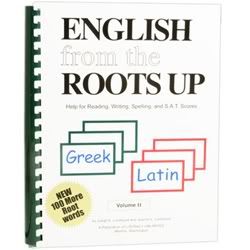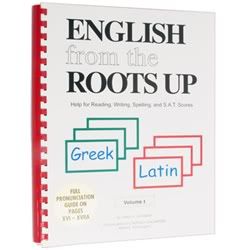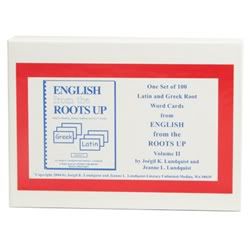We’ve implemented a new foreign language/vocabulary plan this year that’s working quite well! Every school day after Bible reading we have some sort of skill drill – math flashcards, quick math or logic games, and Greek & Latin roots.
Twice a week, using English from the Roots Up by Joegil Lundquist, we are learning one new root word and reviewing all we have already learned. This is resulting in an amazing Greek/Latin connection to words we use everyday and boosting my children’s ability to break apart new vocabulary words for meaning. (Talk about a great way to boost spelling skills AND future ACT/SAT scores!)
Here’s how the program works in a nutshell…
Your children create a notecard that includes the daily root on one side and the definition and derivations on the back. Don’t worry, all the information is included in the guide for you – your children simply copy the information from the guide to their notecard. (This is the author’s preferred method. HOWEVER, I chose to cheat and purchase the prepared notecards. In our extremely busy life, preparing the notecards seemed like busy work. On the other hand, I see the author’s point that actually writing the information makes a bigger impression on the kiddos.)
- Then you simply go over the information on the cards using the short and simple teaching notes provided in the guide. Make whatever connections you can with English and possibly any other languages like Spanish or French that you are studying.
- Finally, use the previous cards as flashcards to review roots, meanings, and derivatives.

In only about 5-10 minutes twice a week, my children are really adding onto their understanding of vocabulary, word parts and spelling! I’m using the curriculum with a 5th grader and an 8th grader, but the author has used it with children as early as 2nd grade.
I’d love to hear about your experiences with English from the Roots Up!
-Written by Cindy, eclectically Charlotte Mason mom of 3. You can find her blogging at Our Journey Westward and view her nature study curriculum at Shining Dawn Books.



I’ve had English for the Roots Up for quite a few years. We’ve used it off and on, but I find my son looking at the notecards sometimes. That tells me that we need to work on it more. 😉
(I got the prepared cards, too. I almost got rid of the book, but it has some good suggestions for studying and additional etymology facts.)
.-= Renae´s last blog ..Perfect Timing =-.
We have been using English from the Roots Up for about two years and love it. Since we use binders and notebooking for each subject, though, I created pages to use for each root. The page includes: the preprinted root, with a red or green box to identify Latin or Greek, a place for the definition, a box for illustrating, and full lines at the bottom for derivatives or sentences. You can see examples on my blog: http://www.4rpress.blogspot.com. The pages are sold online through The Old Schoolhouse Magazine (50% off this week) or CurrClick.
.-= September West´s last blog ..Occupations Notebooking Pages =-.
I have English from the Roots Up on my Future Curriculum list. I am wondering now, though, how soon I can start. Do you really think a second grader could handle it?
.-= Deb´s last blog ..NOT Back-to-School! =-.
I think a very bright, motivated 2nd grader can handle it. I can’t imagine too many of them being overjoyed about the subject matter at that age, though. My very humble opinion is that there’s no real need to rush into this type of subject matter. Some may disagree, but there’s plenty of time for in depth vocabulary/roots practice in later years. I use the younger ages for more interesting fare. 🙂
.-= Cindy´s last blog ..Catching Up =-.
I used this with my 2nd grader and 4th grader last year. We learned 25 of the 100 roots. We are continuing with it this year. My (now) 3rd grader is very interested in it. He enjoys puzzles and codes. To him, when he sees a root word used in English, it’s like a secret code!
We started using this in July and my 3 kids (4th, 6th, and 7th grade) take turns acting them out each day while the other say the root and the definition. They really enjoy it a lot and I regret that I waited this long.
We are using English from the Roots Up this year and even my 5 year old is remembering them. We acted them out the first week and the following two weeks I made illustrations to go with. My question is I am not sure I am saying all the Greek words accurately. She has some with a long vowel mark above it but if you look on the pronunciation sheet it differs. Some of the words that are in my husbands Bible class tools shows how to pronounce the words and is useful but only biblical words are in it. Can anyone help me? I really want to teach them to pronounce the Greek words accurately.
Brandy, the only thing I can think to suggest is an online search for a Greek pronunciation guide of some sort. You have some great ideas for getting younger kids to remember the roots!
A new trend instead of notecards is learning vocabulary through video and visual context. Have you considered anything since? Just wondering if you had any experience with that.
Elisabeth, I’m just now seeing this comment. Sorry! I have not had experience with video or visual vocab lessons. I can imagine that any extra layer of senses would be helpful in teaching/learning, though.
My 2nd and 4th graders actually had a BLAST with this book this year! We learned two words a week, and each child made their own card set. In doing so, each took ownership of his/her “collection.” We also made a set for our bulletin boards (yes, I have G/L roots all over my dining room!). Our bulletin board set included a card with the word on the front only AND another card with a picture illustrating the meaning with a colorful pic one of the kids drew. Spending the time creating the word cards and the illustrations (kinesthetic learning) + seeing them in our school space (visual learning) + talking about words (auditory learning) we run into in our learning that use the roots (and we run into them ALL over the place… math, science, history… you name it!) = two kids and one momma that have turning into word detectives over the 2011-2012 school year. LOVE this book! Our end of the year activity is coming up… we’ve planned to take down all the cards, throw them up in the air, and make a giant word mess in our living room. Then the kids are going to time themselves to see how quickly they can match the root cards to the picture cards… should be fun!! 🙂
Lisa,
What a wonderful mom/teacher you are! So glad this curriculum has worked well for your family, too. We love it!